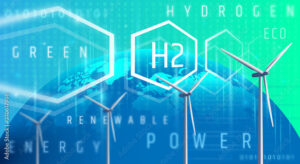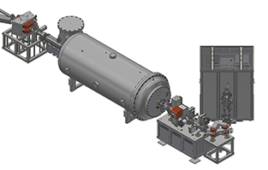From the U.S. Department of Energy
 The U.S. Department of Energy (DOE) has announced $24.9 million in funding for six research and development projects to support the advancement of clean hydrogen for electricity generation. DOE will partner with private companies to research advanced technology solutions that could make hydrogen a more available and effective fuel for electricity generation. This includes improving capture of carbon dioxide (CO2) associated with hydrogen production from carbon-based resources and technologies to use hydrogen more efficiently in gas turbines for electricity generation. The six industry-sponsored projects will fast-track the development of technologies that will improve the performance, reliability and flexibility of existing and new hydrogen technologies. Electricity generated from clean hydrogen will help in reaching President Biden’s goal of having a zero-carbon American power sector by 2035.
The U.S. Department of Energy (DOE) has announced $24.9 million in funding for six research and development projects to support the advancement of clean hydrogen for electricity generation. DOE will partner with private companies to research advanced technology solutions that could make hydrogen a more available and effective fuel for electricity generation. This includes improving capture of carbon dioxide (CO2) associated with hydrogen production from carbon-based resources and technologies to use hydrogen more efficiently in gas turbines for electricity generation. The six industry-sponsored projects will fast-track the development of technologies that will improve the performance, reliability and flexibility of existing and new hydrogen technologies. Electricity generated from clean hydrogen will help in reaching President Biden’s goal of having a zero-carbon American power sector by 2035.
“Across the Department, we’re working to make clean energy sources — like hydrogen — more affordable and accessible to help decarbonize America’s electrical grid and directly combatting climate change,” said U.S. Secretary of Energy Jennifer M. Granholm. “The public-private partnerships announced today are paving the way for more domestic clean hydrogen production and use to support the President’s plans to combat climate change, accelerate clean energy use, and create good-paying clean energy jobs for Americans.”
Hydrogen is a clean fuel that — when combined with oxygen in a fuel cell — produces electricity with water and heat as by-products. Hydrogen can be produced through a variety of low-carbon pathways, including domestic resources like natural gas and waste coal, coupled with carbon capture and storage; biomass; and renewable energy sources like solar and wind. These qualities make it an attractive fuel option for electricity generation and industrial applications, such as in buildings and manufacturing.
DOE’s National Energy Technology Laboratory (NETL) under the purview of the Office of Fossil Energy and Carbon Management (FECM) will manage the selected projects:
- 8 Rivers Capital (Durham, North Carolina) will complete an engineering design study for a new hydrogen production plant that produces 99.97%-pure hydrogen and captures 90–99% of CO2 emissions, which will be transported and stored at Painter Reservoir Gas Complex in Evanston, Wyoming. (Award Amount: $1,412,863)
- Gas Technology Institute (Des Plaines, Illinois) will study the use of ammonia-hydrogen fuel mixtures in gas turbines to potentially strengthen the use of ammonia as a clean low-carbon fuel for electricity generation. (Award Amount: $3,000,000)
- General Electric Company (Greenville, South Carolina) will develop and test gas turbine components with natural gas-hydrogen fuel mixtures up to 100% hydrogen, to study and address combustion challenges associated with burning highly reactive hydrogen fuels. (Award Amount: $5,986,440)
- General Electric, GE Research (Niskayuna, New York) will study the operation of hydrogen-fueled turbine components, which could substantially improve gas turbine efficiency for both simple- and combined-cycle power generation applications. (Award Amount: $6,999,923)
- Raytheon Technologies Research Center (East Hartford, Connecticut) will develop and test the effectiveness of natural gas turbine engine components in high-temperature rigs using natural gas-hydrogen fuel mixtures with increasing hydrogen content. (Award Amount: $4,499,999)
- Raytheon Technologies Research Center (East Hartford, Connecticut) will study, develop, and test an ammonia-fired gas turbine combustor that generates low nitrous oxide emissions, with robust operability and stability for greater than 99.99% efficiency. (Award Amount: $2,999,219)
A detailed list of the selected projects can be found here.
The President’s Bipartisan Infrastructure Law is providing $8 billion for clean hydrogen demonstration and research hubs. Leveraging FECM’s past project investments — including more than $50 million in 31 projects since January 2021 to explore new, clean methods to produce hydrogen and to improve the efficiency of hydrogen-fueled turbines — will establish a solid foundation for critical next-generation demonstrations that will allow us to deliver clean, low-cost power more swiftly to all Americans.
FECM funds research, development, demonstration, and deployment projects to decarbonize power generation and industrial production to remove carbon dioxide from the atmosphere and to mitigate the environmental impacts of fossil fuel production and use. Priority areas of technology work include point-source carbon capture, carbon dioxide conversion, carbon dioxide removal, reliable carbon storage and transport, hydrogen with carbon management, methane emissions reduction, and critical minerals production. To learn more, visit the FECM website, sign up for FECM news announcements and visit the NETL website.





Tell Us What You Think!